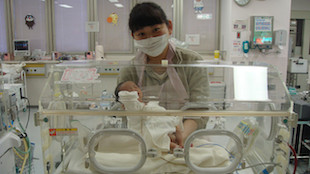 FLICKR, TAMAKI SONO
FLICKR, TAMAKI SONO
Infants start out mostly microbe-free but quickly acquire gut bacteria, which take root in three successive groups. First, Bacilli dominate. Then Gammaproteobacteria surge, followed by Clostridia. But the pace at which these bacterial groups colonize the gastrointestinal tract depends on the time since the babies were conceived, not since when they were born. And time since conception appears to have more of an influence on the infant gut microbiome than other factors, such as exposure to antibiotics, whether babies were born vaginally or by cesarean section, and if they were breastfed. These are a few of the findings from a survey of 922 fecal samples collected from 58 premature babies, published today (August 11) in PNAS.
“It is an interesting study that provides useful data ...













